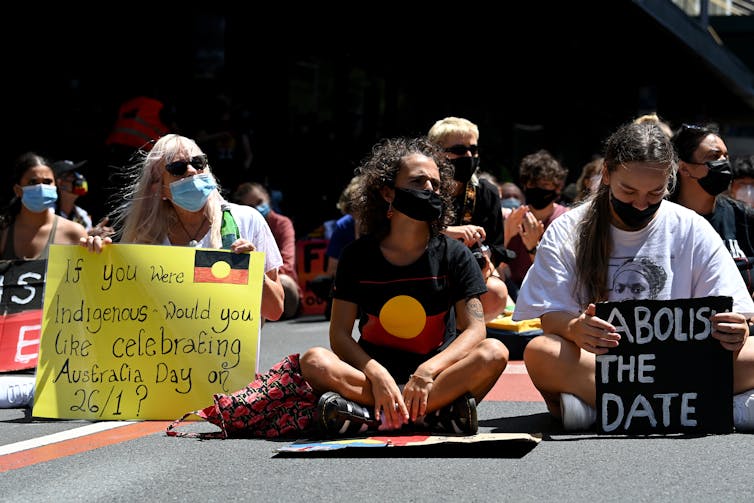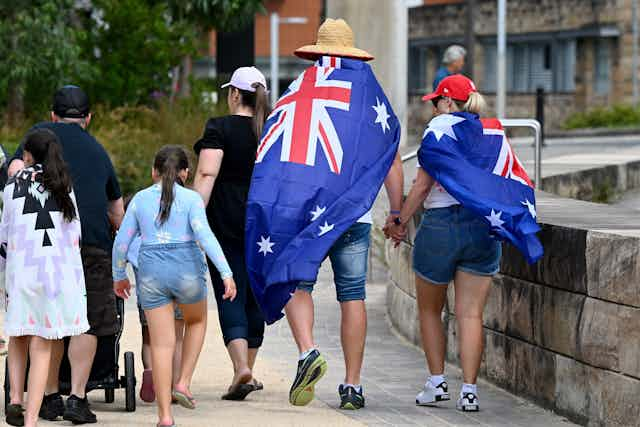The decision by several major retailers to stop stocking Australia Day merchandise has become the latest flashpoint in an ongoing debate over whether the nation should be celebrated on January 26.
In response to this decision, Opposition Leader Peter Dutton has called for a boycott of Woolworths and criticised those who oppose Australia Day as “woke CEOs” and “whingers”. But what do the Australian public actually think about January 26?
In 2021, we conducted a study that showed while 60% of Australians continued to support the celebration of Australia Day on January 26, these figures were significantly lower among younger Australians. We predicted support for the day would continue to decline.
We tested this prediction as part of the latest wave of the Deakin Contemporary History survey, undertaken 20 months after our initial survey. In June 2023, we polled a representative, random sample of more than 3,500 Australians.
Given that other, smaller polls, less representative of the Australian population, grab media attention on this question, it is important to note that, as with our earlier survey, data were carefully gathered to represent a cross-section of Australian society. Participants from all Australian states and territories were randomly selected and data were weighted to ensure they reflected the broader Australian adult population. In short, it is the biggest and best data set we have.
In November 2021, we posed the same proposition: we should not celebrate Australia Day on January 26. We also asked other questions about respondents’ attitudes to Australian and world history.
We thought Australians might change their opinions within a 20-month period, given this question was a dynamic one shaped partly by factors such as the looming Voice referendum and public reporting of the destruction of Indigenous heritage.
Read more: 60% of Australians want to keep Australia Day on January 26, but those under 35 disagree
Our findings supported this thinking. In 2021, 60% of those surveyed stated they strongly disagreed or disagreed with the statement. In 2023, 56% of those surveyed strongly disagreed or disagreed with the statement.
The one other survey undertaken in the same manner as ours was in 2019, when 70% of Australians favoured retaining January 26 as Australia Day. The shift in support from 70% in 2019 to 56% in 2023 is very pronounced.
Read more: New research reveals our complex attitudes to Australia Day
We can conclude that while a small majority of Australians continue to support the celebration of Australia Day on January 26, support for this position is declining.
When we break down the responses by age, it is clear there are significant differences between cohorts on this question. In both surveys, the majority of respondents under 35 agreed we should not celebrate Australia Day on January 26. In 2021, 53% of those under 35 did not want to celebrate on 26 January. In 2023, this figure rose to 57%.
However, agreement that we should not celebrate Australia Day on January 26 increased in every age group. The most significant shift occurred in the 35-54 age group, where agreement with the statement increased from 35% to 42%. Given the short time between surveys, this is a statistically significant shift in public opinion.
Notably, while younger Australians might be leading the push for change, there is a shift towards change in all age groups.
Of course, agreement with this statement may reflect a variety of attitudes to Australia Day. Within the broader debates around January 26, there are those who believe the nation should be celebrated on a different day (represented by the slogan “Change the Date”) and those who believe it is not appropriate to celebrate the nation on any day (reflected in the slogan “Change the Date, We Still Won’t Celebrate”).

Our survey provides evidence that many of those who oppose celebrations on the 26 January are not opposed to national pride or celebration. When we asked respondents whether history should celebrate the nation’s past, 74% of respondents agreed. This suggests a strong desire among many Australians to promote a positive view of Australia.
As with the Australia Day question, however, there were significant differences between the age groups. While 65% of those aged 18-34 answered that history should celebrate the nation, this view increased by age, with 84% of those over 75 agreeing.
These surveys suggest that at this time, only a small – and declining – majority of Australians still support the celebration of Australia Day on January 26. Certainly, it is already inaccurate to argue that this is only the province of the “elite”, the “entitled” or the “woke”.
Further, given that the majority of those under 35 already support changing or abolishing the date, it is highly likely that within the next five to ten years a majority of Australians will hold this view.
There might not be clarity on what we celebrate and when we do it, but the momentum shift away from January 26 is clear. Younger Australians may be leading the push for change but – contrary to what some suggest – there is also a broader and growing discomfort around this much-debated date.

